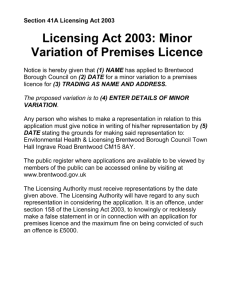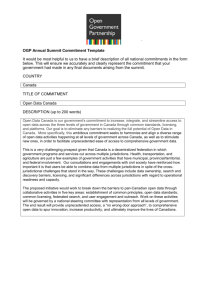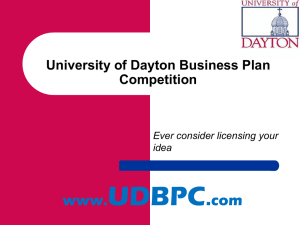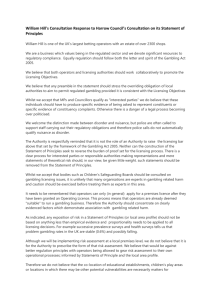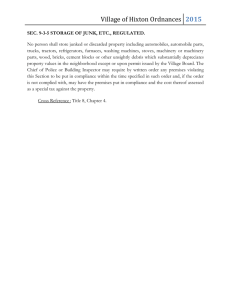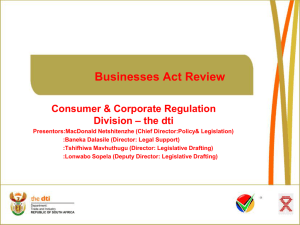Appendix 2 - Mansfield District Council
advertisement
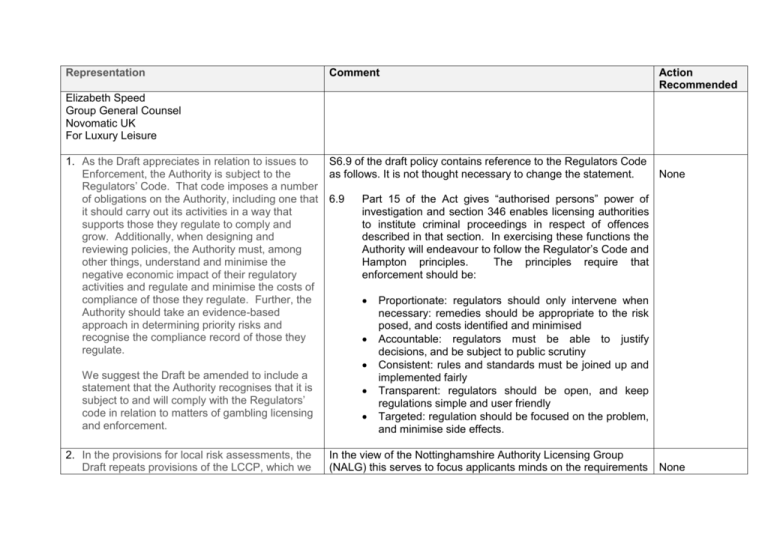
Representation Comment Action Recommended Elizabeth Speed Group General Counsel Novomatic UK For Luxury Leisure 1. As the Draft appreciates in relation to issues to Enforcement, the Authority is subject to the Regulators’ Code. That code imposes a number of obligations on the Authority, including one that it should carry out its activities in a way that supports those they regulate to comply and grow. Additionally, when designing and reviewing policies, the Authority must, among other things, understand and minimise the negative economic impact of their regulatory activities and regulate and minimise the costs of compliance of those they regulate. Further, the Authority should take an evidence-based approach in determining priority risks and recognise the compliance record of those they regulate. S6.9 of the draft policy contains reference to the Regulators Code as follows. It is not thought necessary to change the statement. 6.9 Part 15 of the Act gives “authorised persons” power of investigation and section 346 enables licensing authorities to institute criminal proceedings in respect of offences described in that section. In exercising these functions the Authority will endeavour to follow the Regulator’s Code and Hampton principles. The principles require that enforcement should be: We suggest the Draft be amended to include a statement that the Authority recognises that it is subject to and will comply with the Regulators’ code in relation to matters of gambling licensing and enforcement. 2. In the provisions for local risk assessments, the Draft repeats provisions of the LCCP, which we None Proportionate: regulators should only intervene when necessary: remedies should be appropriate to the risk posed, and costs identified and minimised Accountable: regulators must be able to justify decisions, and be subject to public scrutiny Consistent: rules and standards must be joined up and implemented fairly Transparent: regulators should be open, and keep regulations simple and user friendly Targeted: regulation should be focused on the problem, and minimise side effects. In the view of the Nottinghamshire Authority Licensing Group (NALG) this serves to focus applicants minds on the requirements None suggest is unnecessary. 3. The provisions of paragraph 2.3 repeat the provisions of paragraph 2.2, save for the substitution of the word “making” for “undertaking”. The wording of 2.3 accurately repeats the provisions of LCCP 10.1.1 and as such we suggest that 2.2 be deleted. and is a useful reminder. Agreed Delete para 2.2 4. The first sentence in paragraph 2.5 repeats the Para 2.5 further expands para 2.4 and is therefore relevant. No change provisions of 2.4(d) and as such we suggest that it should be deleted. Further, the provisions of LCCP 10.1.2 require licensees to “… review (and update if necessary) their local risk assessments …”. Accordingly the statement in the Draft that “Risk Assessments must also be updated …” does not accurately reflect the LCCP obligation and we suggest it should be The statement “Risk Assessments must also be updated” relates Amend amended. to the following bullet points as listed in LCCP10.1.1 Para 2. indicated However for clarity this will be amended to state that “risk assessments must be reviewed:” to reflect the wording in the social responsibility code provision. 5. Ordinary code provisions in the LCCP do not There are two types of code provisions set out in the LCCP: have the status of Operating licence conditions, Social responsibility code provisions: compliance with these is but rather set out good practice (see Part II a condition of licences; Code of Practice – LCCP). As such it is not Ordinary code provisions: these do not have the status of accurate to state that an ordinary code provision operator licence conditions but set out good practice. “requires” licensees to share their risk Operators may adopt alternative approaches to those set out assessment with licensing authorities etc. as the in ordinary code provisions if they have actively taken account Draft currently states at paragraph 2.6. That of the ordinary code provision and can demonstrate that an paragraph also includes a date of 8th May 2015 alternative approach is reasonable in the operator's particular for the effective date of the relevant LCCP circumstances; or that to take an alternative approach would as provisions. That is not correct – the correct date is 6th April 2016. be acting in a similarly effective manner. As stated in the ordinary code provision 1.1.1 the Commission expects licensees to conduct their gambling operation in a way that does not put the licensing objectives at risk and to work with the Commission in an open and cooperative way. The Licensing authority would echo those sentiments and would expect licensees to follow suggested good practice where outlined in the ordinary provisions. Ordinary provision 10.1.2 Para 1 states “ Licensees should share their risk assessment with licensing authorities when applying for a premises licence or applying for a variation to existing licensed premises, or otherwise on request.” Our expectation is also that when conducting inspections, we would expect the local risk assessments to be available to view. It would also seem prudent for applicants, having carried out and/or reviewed their risk assessment to include it as supporting evidence with their application. However I would agree that the word requires may be an overemphasis and would suggest that para 2.6 is amended as follows: Amend “The new social responsibility provision is supplemented by an indicated ordinary code provision recommending as good practice that licensees should share their risk assessment with licensing authorities when applying for a premises licence or applying for a variation to existing licensed premises, or otherwise at the request of the licensing authority. Both provisions take effect from as 6 April 2016. Note that the date is also amended 6. Section 158 of the Gambling Act 2005 sets out the definition of “an interested party”, who can make representations under Section 161 of that Act. Under Section 153(2) a licensing authority may not have regard to the expected demand for the facilities which it is proposed to provide. Accordingly any representations on demand, regardless as to which interested party or responsible authority makes such representations, cannot be considered. It does not just apply to existing gambling businesses. Those businesses may or may not qualify as an interested party under Section 158, but it is not for the Authority to predetermine the relevance and applicability of representations that such a party might make. All representations must be based on the licensing objectives and it is not for the Authority to seek to dis-apply the Act in relation to one section of the community. All applications must be considered on their merits and all representations considered likewise. Accordingly we submit that paragraph 3.7 of the Draft should be deleted. Representations are considered on a case by case basis. This None paragraph further reinforces the points made in the representation. The policy does not seek to disenfranchise any business in respect of the ability to make representations. However as many representations in respect of “need “ or “demand” may be from existing gambling businesses, it provides some pointed guidance to those who may not have grasped the concept. See 1.11, final bullet point, 1.14 and 3.17. This seeks to emphasise the need for representations to be focussed upon the licensing objectives. 7. The Draft proposes at Paragraph 3.13 that a The phrases “not considered suitable and sufficient” and None. representation may be made on the grounds that “Otherwise should not be granted” are not to be read in isolation. the applicant’s local risk assessment (which under LCCP 10 relates to risks posed by the provision of gambling facilities at the relevant premises) is “not considered suitable and sufficient”. This wording is, with respect, vague and is not transparent. There is a real risk that it will encourage spurious representations and challenges of local risk assessments, spawning a satellite industry and satellite litigation. If it is for the applicant to identify risks and to address them. With respect, the provisions the LCCP are not directed at a dissection of the risk assessments themselves, but at the treatment of identified risks. Furthermore, a representation should be based on the licensing objectives and the suggestion at Paragraph 3.13 that an application can be rejected on general, unspecified grounds (“• otherwise should not be granted”), is in conflict with the Act and supporting legislation. 8. Paragraph 4.19 states that the Authority will look particularly closely at applications that are made for premises close to sensitive areas or developments and include, as an example, premises licensed for gambling. It does not give any grounds for its statement that such premises are “sensitive areas or developments” for these purposes. Gambling is a perfectly legal and legitimate leisure activity, provided it is regulated and carried out in accordance with the law. As the Authority notes (and as referred above) It is quite clear that the representation must relate to the licensing objectives(iv) and that evidence is to be provided to support any such representation (vi). The policy in no way suggests that an application may be rejected on unspecified grounds and fully supports the legislation requiring that representations must relate to the Licensing Objectives. “Spurious representations” must stand the test or will not be accepted. There is little risk of a satellite industry of litigation. Para 4.19 does not indicate grounds for refusal. It states that the None. authority will look particularly closely at applications made in certain areas. Managing the Gambling Act is about mitigating risk, ensuring that the licensing objectives are upheld and if it is felt that any of these areas create such a risk, the authority must investigate that issue. Again it is reiterated that each representation is considered on its merits. There is no suggestion that, as this representation suggests, an application would be refused because there is a licensed premises in the area. Nowhere in the paragraph is “refusal “ mentioned. demand is not a matter which an authority can have regard to in considering an application. The suggestion that the simple fact that there is another licensed premises in the area would be grounds to refuse an application for a premises licence, is with respect, not correct. The inclusion of this bullet point in the final Statement of Principles and the application of such principles to the premises licence process, would be deeply flawed and open to challenge. As such it should be removed. Gosschalks Solicitors Acting for the Association of British Bookmakers (ABB) 1.9 Local Area Profile The policy states that the local area risk profile has been prepared although it is not attached to the draft statement of principles. As stated above the ABB believes that this should be made clearly available within the body of the licensing policy statement. It is not clear whether or not this profile has been consulted upon and whether or not it contains matters that are relevant to the licensing objectives. The Local Area Profile will be made available to view but will not form part of the policy as any amendments to it will result in the whole Statement of Policy being required to be consulted upon. This is not deemed at effective use of resources. 3.17 Irrelevant Considerations The section will be amended to include the fact that objections Amend based on moral or ethical grounds will not be accepted. indicated. The ABB welcomes the list of irrelevant considerations at paragraph 3.17. This list should be expanded to recognise that the Gambling Commission has stated at paragraph 5.34 of the 5 th as Edition Guidance to Licensing Authorities that considerations such as moral or ethical objections to gambling are not valid reasons to reject applications for premises licences. 4 Licensing Objectives The wording associated with the licensing objective will be Amend amended so it included the full definition. indicated. as The policy will be amended to ensure that the crime and disorder Amend element is related to gambling. indicated. as The draft statement of principles would be assisted by outlining the first licensing objective in full rather than paraphrasing it. The draft statement of principles should be amended to reflect that the licensing objective is preventing gambling from being a source of crime or disorder, being associated with crime or disorder or being used to support crime. 4.8 Policy 3 This indicates that “the authority will have particular regard to the likely impact of licensing on related crime and disorder in the district particularly when considering the location, impact, operation and management of all proposed licensed applications.” The draft statement of principles should be clear that the licensing objective relates to preventing gambling from being a source of crime or disorder. Instances of gambling being a source of crime or disorder will be minimal. Other issues of crime and disorder for example anti-social behaviour in the area are not issues for consideration when considering an application under Gambling Act 2005. 4.13 Protection of Children and Other Vulnerable The advertising of gambling activities is to remain in the policy as None. Persons this is an area that the Licensing Officer will look at when inspecting the premises. This paragraph indicates that “the authority will seek to limit the advertising for premises so that gambling products are not aimed at children or advertised in such a way that makes them particularly attractive to children.” The regulation of advertising of gambling products is heavily regulated and is already covered by the licence conditions and codes of practice. Ordinary Code Provision 5.1.6 requires socially responsible advertising, compliance with CAP and BCAP Codes of Practice and the Gambling Industry Code for Socially Responsible Advertising. The advertising of gambling premises is therefore already the subject of operating licence conditions and not an issue for consideration by the licensing authority. Paragraph 4.19 indicates that where the legislation allows, the authority will look particularly closely at applications that are made for premises close to “sensitive areas or developments” defined as residential areas, schools and other educational establishments, residential hostels for vulnerable adults or premises licensed for alcohol or gambling. The proximity of premises licensed for gambling or alcohol cannot be relevant for the purposes of an investigation as to whether or not an application is reasonably consistent with the licensing objectives. The proximity of gambling premises to residential areas and As far as residential areas are concerned, gambling schools is relevant as it ensure that the necessary checks are premises have, for 50 years, been situated in areas conducted to safeguard the community. This will include the of high footfall or residential areas. They are, premises assessing the local area risk assessment relating to therefore, usually sited where there are children. their policies and procedures. Operators have developed policies and procedures over the last 50 years of betting regulation to ensure that those who are not permitted into betting premises (anybody under 18) do not enter the premises and do not bet. The mere proximity of a proposed premise to a school is not a reason to reject an application. This proximity will be dealt with under the local area risk assessment from which it will be clear about the policies and procedures in place to ensure that those who cannot bet do not do so. Martyn Saxton Head of Planning Community Safety and Regulatory Services There is a need to include a section on the S6.9 of the draft policy contains reference to the Regulators Code None. Regulators Code i.e. that as a Regulator we will as follows. It is not thought necessary to change the statement. comply with the Code in that we will; Part 15 of the Act gives “authorised persons” power of carry out our activities in a way that supports 6.9 investigation and section 346 enables licensing authorities those we regulate to comply and grow to institute criminal proceedings in respect of offences provide simple and straightforward ways to described in that section. In exercising these functions the engage with those we regulate and hear their Authority will endeavour to follow the Regulator’s Code and views Hampton principles. The principles require that ensure clear information, guidance and enforcement should be: advice is available to help those we regulate to meet their responsibilities to comply Proportionate: regulators should only intervene when ensure that our approach to their regulatory necessary: remedies should be appropriate to the risk activities is transparent posed, and costs identified and minimised Accountable: regulators must be able to justify decisions, and be subject to public scrutiny Consistent: rules and standards must be joined up and implemented fairly Transparent: regulators should be open, and keep regulations simple and user friendly Targeted: regulation should be focused on the problem, and minimise side effects.
